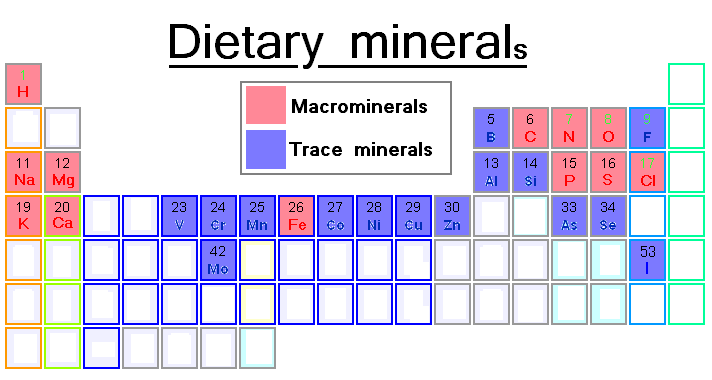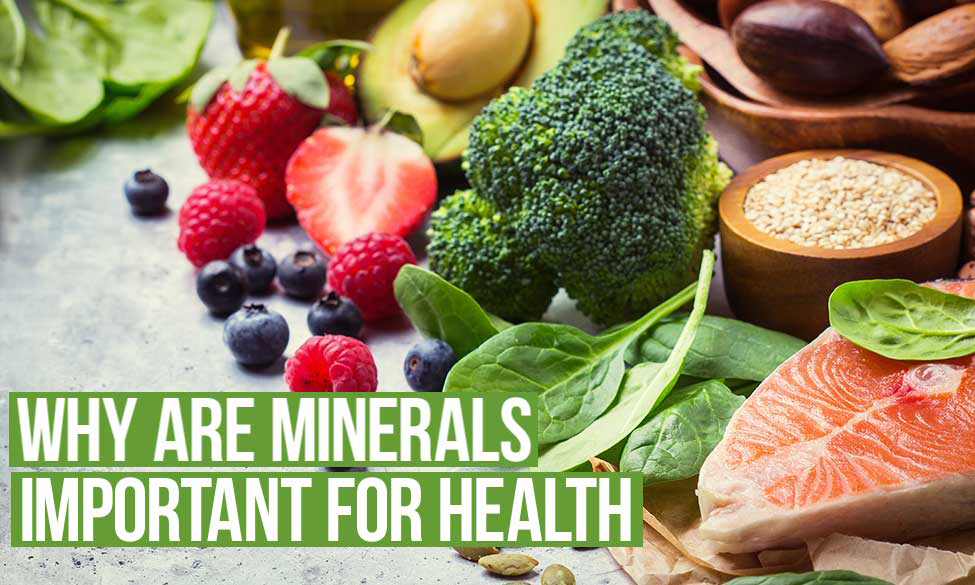Essential minerals, such as calcium, potassium, magnesium, and phosphorus are referred to as “micronutrients”, yet their ‘micro’ label is misleading when considering their significant impact on our health. Their sufficient consumption is indispensable for immune system functionality, robust bones, stable blood pressure, and overall wellness. In this article, we will be exploring why are minerals important for health.
The term ‘micronutrient’ doesn’t downplay their importance; it signifies that essential to vitamins, our body requires nutrients like magnesium, potassium, and phosphorus in quantities smaller than macronutrients including proteins, carbohydrates, and fats. Although the requirement for calcium might be less compared to carbohydrates, it’s crucial not to gamble with an inadequate intake.
So, what’s the reason behind minerals being crucial for comprehensive health? Here’s the overview on these essential nutrients—accompanied by a handy guide showcasing the most critical minerals, their health benefits, and where to find them in food.
Table of Contents
What exactly are minerals?
Minerals are vital compounds that naturally occur in soil and water. Unlike vitamins—apart from the fat-soluble vitamin D—our bodies, along with other living beings, cannot synthesise minerals, hence we need to incorporate them into our diet.
The minerals we obtain through our food come from both plants and animals. The cycle of mineral consumption initiates with plants drawing minerals from the soil; subsequently, animals acquire their minerals by consuming plants (or through water, in the case of fish) or by ingesting other animals that have eaten plants. Therefore, when you’re relishing a generous salad, roasted potatoes, and a succulent steak, you’re not only consuming proteins, carbohydrates, and fats, but you’re also ingesting vital minerals and vitamins.

Why are minerals important?
To put it straightforwardly, maintaining good health would be an impossible task without minerals. A deficiency in micronutrients, including vital minerals, can have a detrimental effect on one’s overall health. Conversely, optimal mineral levels can significantly improve your well-being.
What’s the role of minerals?
- Minerals are indispensable for life. These nutrients perform as auxiliary molecules, aiding enzymes (or unique proteins) in biochemical reactions that govern:
- Blood pressure regulation
- Nerve cell communication
- Digestive processes
- https://healthylifefirst.com/manage-your-stressImmune system function
- Metabolism and energy generation
- Management of sleep and stress
- Bone density, muscle contractions, and more
If this appears overwhelming, it indeed is! To break it down, we can say that minerals carry out four primary roles within our bodies:
- Structure—One of the pivotal functions of minerals is to help construct and preserve the structure of our bodies, inclusive of cells, proteins, bones, organs, glands, among other components.
- Biochemistry—Minerals are fundamental for biological operations that hinge on biochemical reactions. For instance, magnesium plays a significant role in the production of ATP (cellular energy); selenium and iodine are crucial for the function and hormonal balance of the thyroid; zinc is needed for a robust immune system.
- Overall health—Minerals help to maintain healthy mineral balances in the body, which are essential for optimal wellness. For example, a deficiency in magnesium can negatively impact cardiovascular and metabolic health.
- Neural communication—Minerals are vital for nerve signalling. Elements such as sodium, potassium, magnesium, and calcium are indispensable for the optimal performance of every nerve cell and other cellular structures.
Fundamental Minerals: Major Minerals vs. Trace Minerals
As you’ve likely surmised by now, essential minerals are nutrients that are vital for maintaining a long and robust life. Both major and trace minerals (also known as microminerals) are of equal importance to your health; the only distinguishing factor is the quantity your body requires.
Major Minerals: These are required by your body in greater quantities. They include elements such as calcium, magnesium, sodium, potassium, chloride, sulfur, and phosphorus.
Trace Minerals: These are needed by your body in minute quantities. They comprise elements like iron, selenium, manganese, copper, iodine, cobalt, zinc, fluoride, molybdenum, chromium, and additional fluoride.

Sources of Minerals
You’re likely already acquainted with calcium, potassium, magnesium, sodium, and phosphorus. However, there’s a total of 16 minerals which are categorised based on the amount required to uphold health and wellness.
| MINERAL | FOOD SOURCES | HEALTH BENEFITS |
| Calcium | Dairy products, canned fish with bones like sardines, broccoli | Supports healthy teeth and bones, muscle contraction and relaxation, nerve signalling, blood clotting, blood pressure, immune system |
| Magnesium | Nuts and seeds, leafy vegetables, seafood, dark chocolate, artichokes | Contributes to bone health, protein and energy production, muscle contraction, nerve signalling, metabolic and immune health |
| Potassium | Fruits, legumes, vegetables, dairy products | Aids in maintaining fluid balance, nerve signalling, and muscle contraction |
| Sodium | Salt, foods with added salt, soy sauce, coconut amino acids, processed foods, milk, bread, unprocessed meats | Assists in maintaining fluid balance, nerve signalling, and muscle contraction |
| Chloride | Salt, soy sauce, coconut amino acids, canned and packaged foods, dairy products, bread, meats, vegetables | Needed for fluid balance and stomach acid |
| Sulfur | Fish, meats, eggs, poultry, milk, nuts, legumes | Essential for proteins throughout the body, including all tissues and organs, hair, and specialised proteins (enzymes) that regulate natural detoxification processes |
| Phosphorus | Meat, fish, poultry, eggs, milk, processed foods, bread, vegetables, unprocessed meats | Needed for bone mass and teeth health, energy production, maintaining acid-base balance |
| Chromium | Unrefined organ meats like liver, brewer’s yeast, whole grainshttps://healthylifefirst.com/eat-vegetables-for-healthy-life-and-transform-your-health, nuts, cheeses | Aids in insulin regulation and blood sugar levels |
| Copper | Legumes, nuts and seeds, whole grains, organ meats, drinking water | Needed for iron metabolism and enzyme function |
| Manganese | Plants and plant-based foods like tofu | Necessary for enzyme function |
| Molybdenum | Legumes, grains, leafy greens, green vegetables, milk, organ meat like liver | Required for enzyme function |
| Iron | Organ meats, red meats, fish, poultry, shellfish like clams, egg yolks, legumes, dried fruits, dark and leafy vegetables, fortified foods like bread and cereals | Needed for energy production and blood circulation, part of haemoglobin, which carries oxygen |
| Iodine | Seafood, iodized salt, dairy products | Crucial component of thyroid hormone, regulating growth, development, and metabolism |
| Selenium | Meats, seafood, grains | Potent antioxidant |
| Zinc | Meats, fish, poultry, whole grains, colorful and green vegetables | Critical part of many enzymes, helps regulate gene expression, cell signalling, hormone release, and sperm production |
Vitamins and Minerals Deficiency and the Role of Supplements
The fat-soluble vitamins including A, D, E and K are stored in the liver and body fat for prolonged periods. Conversely, water-soluble vitamins, which include the B-complex and vitamin C, are typically stored only for a brief duration.
A deficiency in vitamins can take weeks or even months before it starts to impact your health. For instance, a lack of vitamin C for several months could lead to scurvy.
In certain situations, vitamin and mineral supplements may be recommended to rectify deficiencies – such as folic acid for women who are pregnant or contemplating pregnancy. Others who might be susceptible to a vitamin or mineral deficiency include:
- Pregnant or breastfeeding women
- Individuals who smoke, excessively consume alcohol or use illicit drugs
- People who are on crash diets or stringent diet plans
- The elderly, particularly those who are disabled or chronically ill
- Some vegetarians or vegans
- Women experiencing heavy menstrual periods
- Individuals with food allergies
- People who are suffering from malabsorption (such as coeliac disease, diarrhoea, cystic fibrosis, or pancreatitis)
Bear in mind, supplements are a temporary solution and should only be taken on the advice of a medical professional or a dietitian. Occasional deviation from a healthy eating plan won’t harm you, as long as your usual diet comprises a diverse range of fresh foods.

